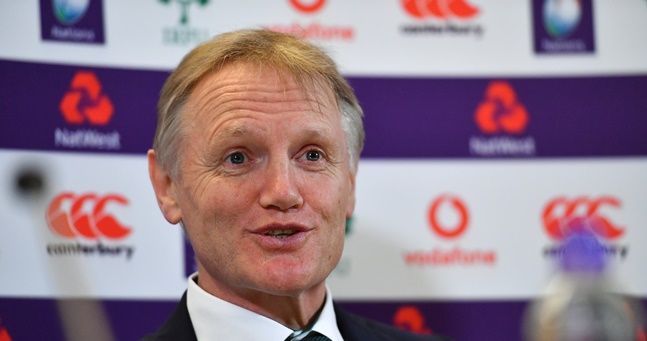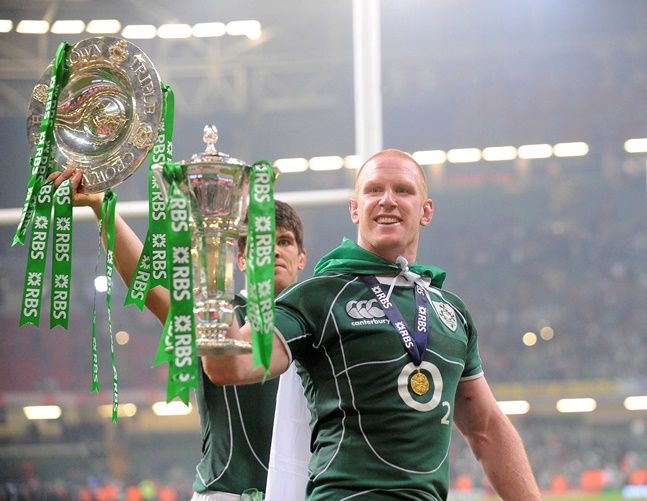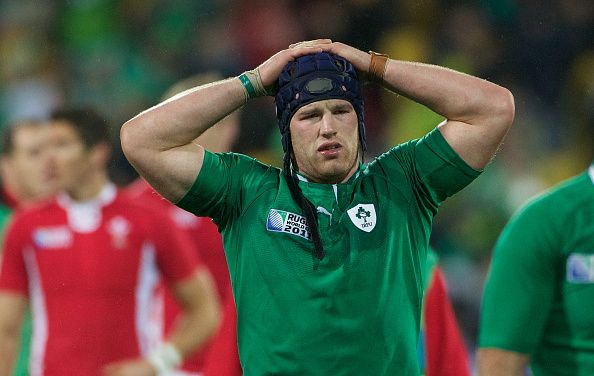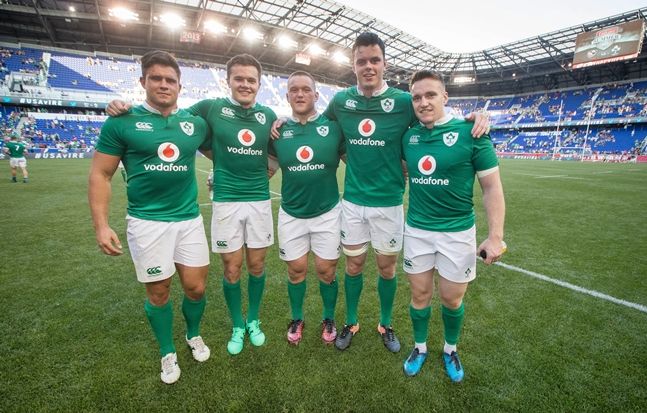

Share
14th March 2018
05:03pm GMT


"I think by evidence of pure performance and results, I think you'd have to say so," said Schmidt when asked if any of his players could be put in the same bracket as O'Gara, O'Connell and O'Driscoll.
"Three titles in five years; there are some very consistent personnel through that period.
"Rory Best, Peter O'Mahony, Devin Toner, Cian Healy, Jack McGrath, and there's Conor Murray and Johnny Sexton obviously; all those players have been incredibly consistent through it, and so has Rob Kearney.
"I'm delighted for Keith Earls too, because he probably would have had two others but he was injured.
"And then there's this young crew - James Ryan doesn't know what it's like to lose in the Six Nations.
"There's kids like that who need to understand what Johnny (Sexton) said, they need to understand that this doesn't happen very often. This is incredibly tough to do.
"And the opportunity that now exists is really precious."
Grand Slams don't happen very often for Ireland but neither did Six Nations championships until Schmidt came along. The goalposts have moved for this Irish team, and while Schmidt named several players when he was asked the question about how the great players from both sides compared, there are only realistically four players at this stage that will be remembered in the same light as O'Gara, O'Driscoll and O'Connell. James Ryan, Tadhg Furlong and Jacob Stockdale could very well join them towards the end of the next decade when their careers enter their latter stages, but for the moment, Conor Murray, Johnny Sexton, Rory Best and Peter O'Mahony have a chance to move into the same bracket as their bar raising predecessors. All four are Lions. All four have won championships before. All four are world class players, and at least one of them can be considered the best player in his position in the world. Four players don't win a side a Six Nations championship, and it would be wrong to not acknowledge the contributions of the likes of Tommy Bowe, Gordon D'Arcy, Stephen Ferris, David Wallace, Jamie Heaslip and all of the other great players that were instrumental in that 2009 win, just as it would be wrong not acknowledge the many great players in this year's side, but as the years pass, and as space seemingly becomes tighter and at more of premium inside the IRFU's trophy cabinet, the 2009 Grand Slam can be increasingly seen as the moment that three of Ireland's best ever players reached their Everest. Mount Everest for this Joe Schmidt led Irish team might actually be at the International Stadium Yokohama next year and not in London this weekend, but this Saturday's match with England is arguably the biggest game of O'Mahony's, Sexton's, Best's and Murray's careers, which is not said lightly given the fact that three of the four players started Lions tests against New Zealand last summer.
The players realise the magnitude of the occasion, and as players that have been fortunate enough to have already achieved so much success throughout their international careers, they know that this is one of the final achievements that they can tick off the list of available honours, that is, of course, until the World Cup rolls around next year.
Mount Everest for this Joe Schmidt led Irish team might actually be at the International Stadium Yokohama next year and not in London this weekend, but this Saturday's match with England is arguably the biggest game of O'Mahony's, Sexton's, Best's and Murray's careers, which is not said lightly given the fact that three of the four players started Lions tests against New Zealand last summer.
The players realise the magnitude of the occasion, and as players that have been fortunate enough to have already achieved so much success throughout their international careers, they know that this is one of the final achievements that they can tick off the list of available honours, that is, of course, until the World Cup rolls around next year.
“Declan said I was just as much a part of it as everyone else in 2009 when I was on the bibs. I definitely didn’t feel that way," said Sexton when reflecting on the famous win in Cardiff nearly a decade ago.
“But I remember some of the talks around that time from the O’Driscolls, O’Connells, O’Garas – they were trying to achieve this for 10 years and you just could tell by their actions through that season how much it meant to them.
“They had to drag along guys like Luke Fitzgerald, Tommy Bowe, Rob Kearney and young guys coming through. It’s very similar to that now.
“I think Rory [Best] is desperate for Grand Slam because he feels he would be a bigger part of it now than he played back then [when Best understudied for Jerry Flannery in four of the five matches.
“For us it is about dragging those young lads on. They probably think they are going to get loads of opportunities but as I know it doesn’t work out like that. I remember playing Scotland in Croke Park for a Triple Crown [in 2010]and almost taking it for granted because I thought I’d have plenty more opportunities like this.
“I still haven’t won a Triple Crown. You’ve got to take these opportunities with both hands when they come.”
Sexton's mentality is quite amazing. At an Off The Ball roadshow last year he bemoaned the fact that he had been taken off the pitch with 17 minutes left to play in a 41-16 third Test hiding for the Lions, at which point, his former teammate Brian O'Driscoll reminded him that firstly, the game had been put to bed, and secondly, and more comically, one of the coaches' sons was sitting on the bench in his position. Owen Farrell is no longer viewed as 'Andy Farrell's kid' but Sexton is seemingly still as competitive and as hungry as he ever has been, a hunger that is exemplified by the fact that he is still looking at the fact that he has never won a Triple Crown just hours after he won his third Six Nations title. It's that mentality that has taken him to the lofty heights that he's reached throughout his career but he'll know, and as O'Mahony, Best and Murray will know too, that this is the one game that will solidify their legacies and the one match that they will not want to look back on with regret. O'Connell cites the 2011 Rugby World Cup quarter-final with Wales as the one match that he'd still like to get back from his playing career. I'm sure O'Gara would love to revisit the Lions second Test in Pretoria if he could. I'm sure O'Driscoll would love to have his time back on the third Test of the 2013 Lions tour if he could.
Sexton, O'Mahony, Best and Murray will want to look back on this weekend as the crescendo to years of sustained success, even if there could still be so much more to come from this Irish side.
The quartet will want to look back at this weekend in years to come as the time they went to Twickenham and won the Grand Slam against the English on their own soil, while the rest of us will look on at them and signal that day as the crowning moment for the catalysts of another golden generation of Irish players, that is, of course, until the next one comes right up behind them.
O'Connell cites the 2011 Rugby World Cup quarter-final with Wales as the one match that he'd still like to get back from his playing career. I'm sure O'Gara would love to revisit the Lions second Test in Pretoria if he could. I'm sure O'Driscoll would love to have his time back on the third Test of the 2013 Lions tour if he could.
Sexton, O'Mahony, Best and Murray will want to look back on this weekend as the crescendo to years of sustained success, even if there could still be so much more to come from this Irish side.
The quartet will want to look back at this weekend in years to come as the time they went to Twickenham and won the Grand Slam against the English on their own soil, while the rest of us will look on at them and signal that day as the crowning moment for the catalysts of another golden generation of Irish players, that is, of course, until the next one comes right up behind them.

Explore more on these topics: